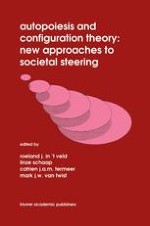1991 | OriginalPaper | Buchkapitel
Applicability of Autopoiesis to Administration Science
verfasst von : W. J. M. Kickert
Erschienen in: Autopoiesis and Configuration Theory: New Approaches to Societal Steering
Verlag: Springer Netherlands
Enthalten in: Professional Book Archive
Aktivieren Sie unsere intelligente Suche, um passende Fachinhalte oder Patente zu finden.
Wählen Sie Textabschnitte aus um mit Künstlicher Intelligenz passenden Patente zu finden. powered by
Markieren Sie Textabschnitte, um KI-gestützt weitere passende Inhalte zu finden. powered by
A remarkable number of applications of the concept of ‘autopoiesis’ has appeared in various fields of the social sciences. The popularity of ‘autopoiesis’ in the social sciences seems to stem from the work of the sociologist Luhmann in the mid-eighties. He used the model of a living system -autopoiesis- which was formulated by Chilean biologists (Varela, Maturana and Uribe, 1974) to describe how a living system is able to generate and regenerate its own organization, in the development of a more general theory of self-referential systems centered around the key concept of ‘communication’. The law theorist Teubner, who was struggling with paradoxes of self-reference in modern methodological approaches, picked up Luhmann’s theory of self-referential systems and communication and developed an autopoietic approach to law (Teubner, 1988). The Marxist political scientist Jessop, interested in the problem why the capitalist system could survive despite its immanent crisis tendencies and continuing class struggle, used the autopoietic theories of Luhmann to develop a model for radical autonomy in societies (Jessop, 1990). The organization scientist Morgan (1986) used autopoiesis in one of his metaphors about organizations. Morgan created an interpretation of autopoiesis which lead him to intriguing ideas on self-referential closure, ego-centrism and self-reflective evolution of organizations.
